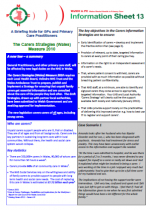WaMH in PC's blog
10 Things You Didn't Know About Carers in Wales

These are quite staggering figures when you take into account that then nation's population is only just over 3million meaning more than 10% of us are carers.
As a result, we thought it would be interesting - with the help of figures provided by Carers Wales - to outline a few of the other facts about the caring industry across Wales and the UK:
- 1 in 8 of adults are carers
- Every year 2.3 million people become carers
- Carers save the Wales economy £7.72 billion per year
- Nearly 3 million people in the UK juggle caring with holding down a job
- The main carers' benefit is worth just £55.55 for a minimum of 35 hours - £1.58 per hour
- 90,000 people in Wales provide over 50 hours of care per week
- People providing high levels of care are twice as likely to be permanently sick or disabled
- Over 1 million people in the UK care for more than one person
- 58% of carers are women and 42% are men
- By 2037 the number of carers in the UK will have increased to 9 million
Last week we published our latest and 13th Information Sheet entitled The Carers Strategies (Wales) Measure 2010 which outlines the key objectives of new Welsh legislation for carers within Wales.
The Carers Strategies (Wales) Measure 2010 requires Local Health Boards, Velindre NHS Trust and the Wales Ambulance Trust to draw up a strategy to ensure unpaid family carers receive essential information and are consulted about the care of the people they look after.
The draft strategies have been submitted to Welsh Government and are awaiting approval for implementation.
If you have any questions about Information Sheet 13 or trouble viewing or downloading it please contact our Project Manager Lesley Hills via email at lhills@rcgp.org.uk or on 029 2050 4516.
Essential Characteristics and Components of Primary Care Report
We'd like to introduce a new report which looks at the experiences and feelings of GPs and mental health practitioners in North Wales.
The Essential Characteristics and Components of Primary Care Mental Health Services report uses scientifically-proven qualitative research techniques to look at the key components needed to create an effective primary care service.
The report was commissioned by WaMH in PC and we feel the evidence it has produced is applicable across Wales and all health boards and is an extremely valuable read.
The report highlights the importance of trust, communication and person centredness in creating services that really help patients and provide an environment which works for all the professionals working within it.
We would welcome the opportunity to discuss the matters raised by the report and to make suggestions on certain practical actions which could be taken to embed these essential characteristics into local arrangements.
The report was authored by Helen J. Lewis, BSc (Hons), MSc, PhD and Seren Haf Roberts, Dip N (MH), RN (MH), BSc(Hons), PhD, MSc and can viewed and downloaded from the following link - Essential Characteristics and Components of Primary Care Mental Health Services.
Free Pimary Care Dementia Management Training
With the help of two of our partner organisations we're offering 2 free dementia in primary care training courses for GPs, trainee GPs and practice nurses across Wales.
The first free training course is entitled Diagnosing and Managing Dementia in Primary Care and is a newly-commissioned online self-assessment module aimed at GPs.
The module has been written and reviewed by a team of GP authors and editors who actively practice in primary care and contains 11 clinical case problems, together with comprehensive explanations and links to further reading.
The second course is entitled Management of Dementia in Primary Care and is an interactive training module aimed at GPs, trainee GPs and practice nurses.
The module contains a series of cases with questions to guide you through each topic with a short pre-test at the beginning which is repeated at the end so you can see how much you’ve learned.
For further information on how to access these 2 courses please visit and read our Free Dementia Training page.


